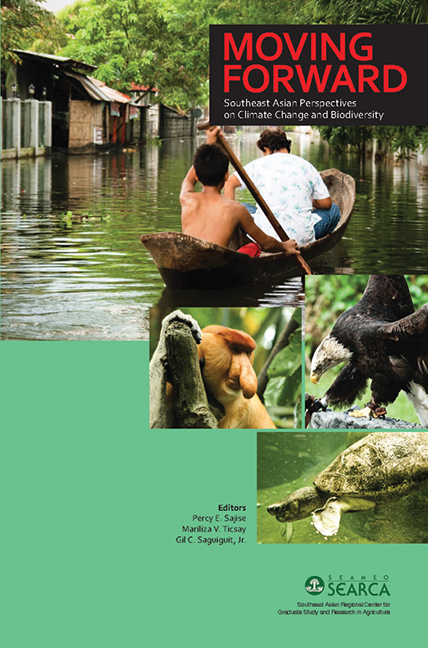Foreword
Published online by Cambridge University Press: 21 October 2015
Summary
Climate change is not just a buzz word. It is real. In fact, an overwhelming amount of scientific evidence supports this. Across the globe, we are beginning to experience the effects of climate change.
For the most part, climate change is man-made, mostly by industrialised countries. Since the advent of the industrial era, the rate of increase in temperature has been increasing. Because it is man-made, there is optimism that climate change can be managed. Managing it, however, requires nothing less than a concerted global action.
There has been much media coverage on the more dramatic threats and consequences of climate change, such as tsunamis, forest fires, floods, severe droughts, and other such calamities.
Meanwhile, what needs greater attention are the less dramatic, yet potentially more widespread and long-term consequences of climate change, such as decreasing agricultural yields, increasing water stress, continuing spread of infectious diseases, and persistent changes in the natural ecosystems. All of these consequences threaten the earth's biological species.
The tropics, which holds most of the world's biodiversity, has been identified as being the most vulnerable to climate change. While the projected negative impacts on biodiversity are well articulated, the contributions of biological resources in reducing the impacts of climate change on people and agricultural production have not been fully appreciated.
To address this gap, the Southeast Asian Regional Center for Graduate Study and Research in Agriculture (SEARCA), in partnership with the ASEAN Center for Biodiversity, World Agroforestry Centre, Bioversity International, and Silliman University, organised a conference in Pasay City, Philippines on February 2008. This conference aimed at establishing the link between climate change and biodiversity in the context of agriculture and food security. The conference informed us on how different countries have adopted and mitigated the effects of climate change, and how parallel efforts on biodiversity conservation play an important role in this whole effort.
As a regional center for agricultural and rural development, SEARCA is keenly interested in knowing how Southeast Asian countries, particularly their rural communities, are coping with the effects of climate change.
- Type
- Chapter
- Information
- Moving ForwardSoutheast Asian Perspectives on Climate Change and Biodiversity, pp. xv - xviiiPublisher: ISEAS–Yusof Ishak InstitutePrint publication year: 2010

